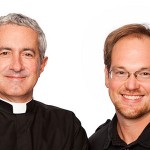This week, I am sharing my reflections on the recent Mid-Atlantic Congress in the Archdiocese of Baltimore. Find all of my #MACongress posts online here.

Session two of the first day of Mid-Atlantic Congress found me attending “Speaking of God in a Disenchanted World: Religious Education and Secularism” with Hosffman Ospino, PhD, an Assistant Professor of Theology and Religious Education at Boston College’s School of Theology and Ministry. Here is the description for this session, which was kindly sponsored by Our Sunday Visitor:
Religious educators and evangelizers are increasingly concerned about the rising number of people who claim not to believe (or not care about belief) in God. Is it possible to reconcile “the secular” and “the religious”? Are all possibilities of dialogue closed? Are we in the midst of a battle in which only one of these dimensions will emerge victorious? These are questions that call for reflection about Christianity’s public dimension in our society. This workshop proposes language and strategies to engage in this important conversation, particularly in the context of religious education with youth and young adults.
To say that this session felt like a graduate-level theology course would not be an exaggeration. And yet as philosophically complex as Dr. Ospino’s talk was, it was among my favorite at Congress. He began his remaks by looking at the intersection of faith and culture, at the paradigm shift in Western culture since the 16th century and at what session participants thought of when they heard the term “secularism“.
After looking at the “signs of our times”, we went on to examine 3 definitions or ways of understanding secularism, as well as ways in which people in our times are responding to the challenges of an increasingly secular society. Next Dr. Ospino spoke to Religious Education’s empowering impact and the fact that it leads Catholics to witness to their faith — that we should effectively view rising secularism not as an obstacle, but rather as an opportunity. Along those lines he proposed the three following possibilities:
- The secular is not necessarily the opposite of the sacred, but its mediation – the secular becomes a challenge when we exclude the sacred. Reclaim the power of the secular to mediate the sacred – engage God through the popular culture.
- Enter the “courtyard of the Gentiles”: listen and dialogue – don’t lose identity but engage in dialogue without abandoning Catholic faith.
- Catholics must be articulate about what we believe: religious literacy, theological insight, expressive creativity.
Dr. Ospino concluded his remarks with five “signs of hope” for the Catholic Church in the United States. These included (with my notes, italicized):
- Young people’s trust of the sacred – engage it so we don’t lose them
- Immigrant communities – most bring the openness and are shaped by pre-modern mentality – take advantage of it (that God is at center of world) – 60% of Catholics from an ethnic group (40% hispanic) – to see a sign of hope go into ethnic communities – don’t have to sell it
- The theological community – in pastoral circles, some are suspicious of theologians – we need to work with them, there is much we can do.
- Artists and intellectuals – we need more creativity, more Catholic art, foster artists and intellectuals
- Social media – courtyard of the Gentiles for many people – blogs, FB, twitter, even bishops and popes jump onto this bandwagon
I’m certain that this article has not done justice to what I’d consider to be a “master course” in theology from Hosffman Ospino, PhD and I apologize for any points of this that I may have missed in sharing this with you. I’d like to strongly recommend his book Peter’s Catechism: Who Do You Say That I Am? Why Did You Doubt? Do You Love Me? published with Liguori Publications. If you find yourself with the opportunity to hear him speak, definitely attend — you will walk away not only educated, but also greatly inspired.











